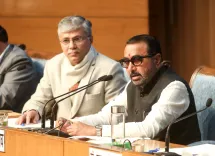Year-End Review 2024: India’s Manufacturing Sector Achieves Remarkable Growth Across Diverse Industries
New Delhi, Dec 31 (NationPress) India's manufacturing industry is establishing a strong foothold on the global scene, spanning various sectors from electronics to steel. The nation has become the third-largest smartphone exporter and a net exporter of steel for the first time in history.
Fueled by government initiatives and strategic investments over the past ten years, India has consistently positioned itself as a global manufacturing powerhouse. This includes achieving record outputs in crude steel, responding to both domestic and international demands, and leading innovations in electric vehicles and consumer electronics.
Previously niche sectors, such as toys, are now witnessing extraordinary growth, with exports skyrocketing by 239 percent while imports have decreased by 52 percent.
Furthermore, India's pharmaceutical sector is thriving, with 748 USFDA-approved facilities, showcasing its high-quality manufacturing capabilities. The increase in solar panel and wind turbine production underscores India’s commitment to renewable energy.
The manufacturing sector has enjoyed impressive development in 2024, highlighting its evolution into a global leader. This year also commemorates a decade of the Make in India initiative, during which significant progress has been made to elevate India to manufacturing prominence.
Over the past ten years, India's manufacturing landscape has transformed significantly, largely due to the Make in India initiative. Notable developments include the rollout of Production Linked Incentive (PLI) programs across 14 sectors, stimulating growth in electronics, steel, pharmaceuticals, and defense manufacturing. This has led to remarkable milestones, including a 239 percent rise in toy exports and a 600 percent increase in mobile phone production.
India has emerged as a net steel exporter, with steel production doubling and a marked reduction in import reliance for pharmaceuticals and telecommunications equipment. Defense exports have reached over 85 countries, and the nation has made strides in semiconductor manufacturing and renewable energy, bolstering its global manufacturing reputation by 2024.
The fiscal year 2023-24 recorded an economic growth of 8.2 percent, supported by an industrial growth rate of 9.5 percent, with manufacturing and construction sectors nearing double-digit growth.
A variety of initiatives have streamlined India's manufacturing environment throughout 2024. These include the Jan Vishwas 2.0 Bill, and the development of plug-and-play industrial parks in nearly 100 cities, attracting substantial investments.
India has attained its highest-ever levels of steel production and consumption in FY24, becoming a net exporter of finished steel, with production increasing by 50 percent since 2014.
With a valuation of $50 billion, the pharmaceutical industry ranks as the world's third-largest by volume. Investments of Rs 30,000 crore through PLI schemes have catalyzed growth in biosimilars, vaccines, and generic medicines, solidifying India's global status in affordable healthcare solutions.
The labor-intensive Micro, Small, and Medium Enterprises (MSMEs) remain essential to India's manufacturing sector, contributing 35 percent of total output and 45 percent of exports. As of 2024, 4.7 crore MSMEs are registered on the Udyam Portal, benefiting from credit schemes that provided 92 lakh guarantees worth Rs 6.78 lakh crore.
The Prime Minister's Employment Generation Programme has aided over 89,000 micro-units, creating jobs for 7.13 lakh individuals in FY24.
The PLI schemes have been pivotal in propelling India's manufacturing sector, establishing it as a global industrial hub. These initiatives have attracted over Rs 1.28 lakh crore in investments, generating 8.5 lakh jobs, and enhancing exports by Rs 4 lakh crore, culminating in production and sales worth Rs 10.8 lakh crore.
The electronics manufacturing sector, in particular, has experienced exponential growth, with domestic production surging by 400 percent from Rs 1.9 lakh crore in 2014 to Rs 8.22 lakh crore in FY23.
This includes the mobile phone industry, where the direct workforce has more than tripled between FY17 and FY22, providing significant benefits to female employees.
The pharmaceutical sector has similarly prospered, with Rs 30,000 crore in investments under the scheme, enhancing India’s production capabilities for APIs, vaccines, biosimilars, and biologics, reinforcing its position as the world’s third-largest pharmaceutical market by volume. Additionally, PLI support for white goods like air conditioners and LED lights has decreased import reliance, boosted domestic production, and generated jobs.
The steel industry has undergone a significant transformation, with production increasing by 70 percent since 2014, establishing India as a net exporter of finished steel. The success of the PLI programs has also extended into new domains, with 2024 witnessing the introduction of incentives for biomanufacturing and the launch of the Critical Mineral Mission, aimed at securing resources vital for manufacturing sectors like EVs and semiconductors.
By fostering large-scale investments, creating job opportunities, and boosting exports, the PLI schemes have positioned India as a crucial player in global value chains.
The electronics manufacturing cluster initiative attracted Rs 40,000 crore in investments, leading to the creation of 5 lakh jobs, while solar capacity has increased 25-fold since 2014, demonstrating India's commitment to clean energy.
Over the last decade, the textiles and apparel sector has seen a 20 percent increase in exports, reaching Rs 2.97 lakh crore, making India one of the top five global exporters in this field.
In 2024, India's semiconductor industry reached a historic milestone. The nation is on track to achieve an annual capacity of 2,500 crore chips, producing semiconductors for applications in automotive and electric vehicles, consumer electronics, and telecommunications.
The establishment of India's inaugural semiconductor fabrication facility, backed by a $100 billion investment, will enable the production of 50,000 wafer starts monthly, catering to sectors such as defense, EVs, and high-performance computing. Indian firms have also begun manufacturing silicon carbide devices to meet the global demand for advanced chips.
Simultaneously, research in semiconductor manufacturing has reached new heights with initiatives such as the National Research Foundation, which allocated Rs 1 lakh crore to encourage private-sector innovation.
Moreover, the forthcoming Bharat Semiconductor Research Centre and collaborations between Semiconductor GCCs and IITs are equipping engineers and advancing next-generation chip development.










